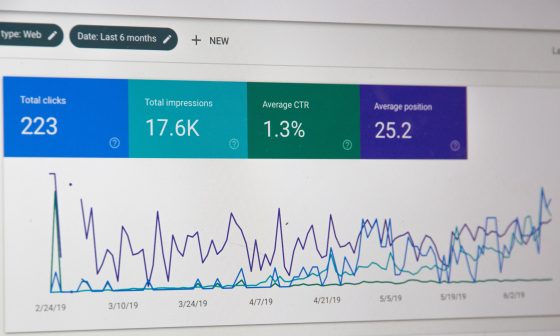Let’s be real. The way customers find and interact with businesses has changed dramatically. Having a website alone isn’t enough anymore. Customers turn to Google, social media, and online directories to make decisions, often before ever stepping into a store or sending an inquiry.

But digital profiles aren’t just static listings anymore. AI-driven overviews are changing the game, influencing how businesses show up in search and how customers engage with them. If you’re not keeping up, you’re missing out on visibility and sales.
The AI Shift in Local Search
💡 Did you know?
Google’s AI-generated search summaries are now surfacing key business details without users even clicking on a website. This means your business information, reviews, location, and services must be accurate and optimized across all platforms.
When customers search for a service or product, AI curates the most relevant details from your Google Business listing, social media, and online reviews. This shift means:
- Customers get answers faster, often without visiting your website.
- Reviews, images, and business updates play a bigger role in first impressions.
- Engagement, such as responding to reviews and updating listings, matters more than ever.
Why This Matters Now More Than Ever
I’ve seen businesses lose potential customers just because their digital profiles weren’t optimized. A friend of mine owns a boutique coffee shop, and for weeks, customers kept showing up when the shop was closed.
Why? Because Google had outdated hours listed. Imagine the frustration, both for the customers and for the owner who had no idea this was happening!
The bottom line? If AI pulls outdated or incorrect information about your business, you could be unknowingly driving people away.
Optimizing for AI-Driven Local Search
1. Keep Listings Accurate and Up-to-Date
If your business hours, contact details, or address are outdated, AI-driven summaries may misrepresent your business. Regularly check your Google Business Profile, Yelp, and other listings to ensure accuracy. It’s a simple task but can prevent so many headaches.
💡Set a reminder every two weeks to review your listings. Small updates, like adjusting seasonal hours or adding new photos, can make a big impact on AI-driven search rankings.
2. Encourage and Manage Reviews
AI prioritizes businesses with recent and relevant reviews. Responding to reviews, both positive and negative, shows engagement and credibility. Google’s algorithms reward active businesses, making you more visible in local search results.
One of my favorite local bookstores does this exceptionally well. They reply to every review, thanking happy customers and addressing concerns from less satisfied ones. It makes their business feel approachable, and it keeps them ranking high in search results.
💡 Instead of just saying, “Thanks for your review,” personalize your responses. Mention something specific about the customer’s experience to show you genuinely appreciate their feedback.
3. Make The Most Of High-Quality Visuals
Search AI favors businesses with clear, high-resolution images. Upload updated photos of your storefront, team, and products to platforms like Google Business, Instagram, and Facebook. AI extracts visual cues, so make sure they represent your brand accurately.
I always tell business owners: if your online photos are outdated, blurry, or poorly lit, customers will assume your business is outdated too. A fresh, high-quality image can do more for your brand than any marketing copy ever could.
💡 Take photos during natural daylight for the best quality. Also, update images regularly, businesses that upload new photos frequently tend to perform better in search.
4. Utilize AI-Powered Chat and Messaging
Many platforms now integrate AI-driven chatbots to answer customer questions instantly. Implementing these tools on social media or your website can improve engagement and even drive conversions. Customers expect quick responses, if you can’t provide them with those then AI-powered solutions can help bridge the gap.
💡 Even if you use chatbots, ensure there’s a human element. A well-placed “We’ll get back to you shortly” message makes automated interactions feel more personal.
Managing Your Digital Profile Across Platforms
Customers find you in different ways: Google searches, social media, review sites, and voice assistants. Your digital profile must be accessible and consistent across all these channels.
- Consistency is Key
Make sure your business information matches across all platforms. Even small differences, like writing “St.” instead of “Street,” can cause confusion and impact your ranking in AI-driven search results. A restaurant I frequent recently rebranded, but because they didn’t update all their listings, half their online profiles still had the old name. That kind of inconsistency can make customers wonder if a business is even still open!
💡 Use a spreadsheet or a listings management tool to track all your business details across platforms.
- Analyze Customer Behavior
Your digital profile provides valuable insights. Track which products get the most clicks, what time people reach out, and what questions they ask most. Use this data to improve your offerings and customer experience. If you see a spike in searches for a specific service or product, capitalize on it!
Monitor Click-Through Rates: If certain products or services consistently get more clicks, that’s a strong indicator of customer interest. Consider featuring these items more prominently or even running promotions around them.
Check Engagement Patterns: Are most inquiries happening during certain hours? If customers tend to reach out in the evenings, that’s when you need to be most responsive.
Identify Common Questions: If customers frequently ask about a specific service, make sure the information is easily accessible on your digital profile. A simple tweak to your business description or FAQ section can save time and improve customer experience.
Leverage Seasonal Trends: If you notice increased searches for certain products during specific times of the year, plan ahead. Stock up on inventory, create targeted promotions, and update your listings accordingly.
- Stay on Top of Reviews
Reviews act as digital word-of-mouth. A thoughtful response to a review, good or bad shows that you care. Keep up with reviews daily and encourage happy customers to leave feedback. I once saw a bakery double its reviews in three months simply by adding a polite note to receipts asking customers to share their experience online.
The Power of Reviews
Reviews are like gold for your business. When someone takes the time to write about their experience, it matters – good or bad. Think about it: don’t you check reviews before trying a new restaurant or buying something online?
Here’s how to handle reviews right:
- Thank people for positive reviews – it shows you care
- Address negative reviews professionally – no getting defensive
- Fix problems that come up in reviews – show you’re listening
- Ask happy customers to share their experience – but don’t be pushy
Tools That Can Help
Google Business Profile Manager
This is your go-to tool for managing how your business appears on Google Search and Maps. It’s free, easy to use, and arguably the most important tool for boosting your online visibility. From updating your business hours to responding to customer reviews, this tool serves as your home base for everything Google-related.

Synup
Synup is an all-in-one platform designed to take the hassle out of managing your digital profiles. Think of it as your command center, where you can control every aspect of your online presence.

Here’s what Synup can do for you:
- Keep all your business listings updated across multiple platforms, from Google to Yelp, in one place.
- Synup automatically flags outdated or inconsistent information, saving you from the manual work of spotting errors.
- Make changes once, and Synup ensures your updates are reflected across all platforms seamlessly.
- Gain insights into how well your listings are performing, from visibility metrics to customer engagement data.
- Also helps you manage your social media profiles across all platforms which includes creating and scheduling posts, tracking reviews, and answering all your comments from a single dashboard
- It also helps with tracking your reviews across various platforms easily with various review management tools and capabilities that are in-built.
AI and the Future of Business Discovery
AI isn’t just changing how customers find businesses. It is redefining what makes a business credible online. Companies that actively update their digital profiles, engage with customers, and leverage AI tools will stay ahead in local search.
Instead of relying solely on traditional SEO, businesses must now think about how AI curates their presence. It is no longer just about being found. It is about being featured in AI-driven search results. The businesses that thrive will be those that take an active role in shaping their online presence rather than just hoping to be discovered.
A Simple 4-Step Plan To Help You Start
- Audit Your Listings: Check every platform where your business appears. Update incorrect details and ensure consistency. AI pulls data from various sources, so accuracy is key.
- Set a Weekly Check-in: Spend 30 minutes each week reviewing your online presence and responding to reviews. AI favors businesses that stay active and engaged.
- Keep Content Fresh: Post new photos, share updates, and ensure your business looks active and engaging. AI-driven results prioritize businesses that appear vibrant and up-to-date.
- Engage with Customers: Respond to reviews, answer questions, and make it easy for people to reach you. Interaction signals to AI that your business is relevant and trustworthy.
Final Thoughts
If your business information isn’t optimized, engaging, and consistently updated, AI-driven search might not surface you at all. Instead of waiting for customers to find you, take charge of your digital presence. Stay ahead by keeping your profiles fresh, responding to reviews, leveraging AI tools, and making your business the best version of itself, both online and offline. AI is reshaping local search, and the businesses that embrace it now will lead the way in this new era of discovery.
FAQs
What is local search technique in AI?
Local search in AI refers to how artificial intelligence curates and ranks local businesses based on user queries. Instead of just matching keywords, AI analyzes relevance, reviews, engagement, and real-time data to determine the best results. If your business details are outdated or inconsistent, AI might push you lower in rankings or not show you at all.
How will search change with AI?
AI is making search faster, more intuitive, and less reliant on clicks. Instead of just listing websites, AI now summarizes information, answers questions directly, and highlights key details from multiple sources. This means businesses need to optimize not just their websites but their entire digital presence, including social media, reviews, and business listings, because AI pulls from everywhere.
How to use AI for local SEO?
To leverage AI for local SEO, keep your business information accurate, engage with customer reviews, and regularly update your digital profiles. AI prioritizes businesses with fresh content, high engagement, and strong reputations. You can also use AI-powered tools like Google’s Business Profile insights to track customer behavior and fine-tune your strategy.
How is artificial intelligence reshaping our world?
AI is transforming everything – from how we search for information to how businesses interact with customers. It automates repetitive tasks, personalizes experiences, and even predicts trends before they happen. In business, AI is shifting the focus from passive marketing to real-time engagement, forcing companies to be more proactive, responsive, and digitally savvy to stay relevant.



